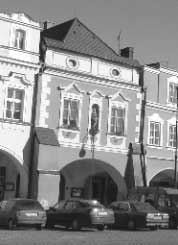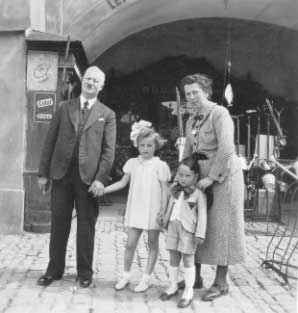
| ▪ back | ||||
The Story of the Popular Storekeepers |
||||
|
Irma Fingerová (born on 23rd May, 1884) was Augusta Ledererová´s daughter and the oldest of six children. Her mother was soon widowed and together with her son-in-law Dežo Adler, a Hungarian, she set up the Lederer-Adler factory in Litomyšl, which made shoes. Irma married Rudolf Finger from Kozolupy (born on 26th February, 1877), who also had five brothers and sisters. At the beginning of their marriage they lived in Pardubice. Then they moved to Česká Lípa, where Rudolf´s sister Emilie Flašnerová lived. Her husband had problems with his business and Rudolf was supposedly going to help him. Irma and Rudolf´s son Jan was born in Česká Lípa and later their daughter, Markéta, on 27th April, 1909. Mr. Flašner and Mr. Finger did not get on very well and they grew apart after about three years. At that time, 96, Smetana Square in Litomyšl was for sale. It contained a shop as well as a flat. The Fingers borrowed money to buy the house and new goods and they moved to Litomyšl and set up a hardware store there. (The store does not exist today. In its place is a corridor separated from the pillared arcade by a wooden entrance door). On 8th August, 1911, the Fingers´ daughter Micie was born, called Mici or Micinka. She was beautiful but very frail and they often had to call out a doctor to see her. Sometimes she had strange fits and fainted. Things at the store went well and people soon got to like it. It was a narrow "noodle-like" room covering nearly the whole length of the house. Their flat was on the first floor; it was reached from the store by a narrow staircase. There was a piano in the room with windows leading to the square. Both the girls tinkled on it rather than played it seriously. At least that is how eyewitnesses described it. It is true that the house had a back entrance as well, but the children were not allowed to use it because there was a storeroom and they could have hurt themselves. There were shelves filled with goods on both sides of the shop. People used to say that you could buy everything and anything at the Fingers´: knives, forks, door handles, taps, etc. Mr. Finger had small parts stored in labelled drawers, so the shop resembled a chemists. On the other hand, some other areas were "messy", but Mr. Finger could always find what he was looking for. He was very helpful and he always opened the shop even if it "was closed", like on Sundays. People from other villages would come to Litomyšl to go to church and then they would call into the shop before lunch to buy what they needed. They rang the bell at the Fingers´door knowing that the shop owners would not turn them away. The shop had windows, which always were full of goods. The Fingers also displayed their goods in the pillared arcade. Irma did not like doing this, but Rudolf used to say ´it is good to exhibit everything so people can see things with their own eyes.´ Mr. Finger and his wife spent all day in the shop and so they had a housemaid to help in the house. Many girls came and went though, because they did not like not having their own key to the house. When they wanted to go out, Irma would unlock the door and they had to be back by nine o´clock. They had to ring the doorbell and somebody from the family woud open the door. Mrs. Finger was very skilful. She had been to convent school for a while, perhaps in Častolovice. They did not mind the fact that she was Jewish. She learned various types of handiwork at school, including knitting and needlework. She liked to remember the nuns. Once, she donated a beautiful knitted table cloth to a raffle. Then she bought a ticket, which was supposedly very expensive, and, with the ticket, won the cover back. One of her daughters was later given it as a wedding present. The owners of the inns surrounding Litomyšl would shop there. Mr. Finger, who wanted to return the favour, often used to go for trips with his family on Sundays. They always dropped by somewhere to have lunch and rest. Lunch was always simple, for example, bread and milk, but in Nedošín, in a pub called "Na Žabárne" (Toads), they used to have a delicacy, frogs legs. Their daughter Markéta got married to Viktor Frey in May, 1929. Micie married Otto Sgal in 1932 or 1933, and their son Jan, supported by his friend Táňa Hodanová, an actress, left for the Netherlands in 1939 and later went to England. He set up his own business there - a factory where stockings and underwear were made and repaired. He joined the R.A.F., got married in England, and survived the war. Mrs. Pavlišová, née Zelinková, is said to have a suit he made (trousers and an anorak made of English wool). When, in 1938, the political situation got worse, the Fingers´ friends and relatives used to meet at their house, in the room with windows leading to the courtyard. They talked a lot about the future and also about leaving the country. Most of the people present considered leaving useless, because they thought that they would not settle in abroad. On 15th March, 1939, a German military band was playing in Horní Square. The Germans were handing around goulash and soup. When Irma heard the music - she was in the shop at that moment - she went out to the pillared arcade. Her daughter Markéta recalls how much her mum cried just listening to the song Green Groves. The Fingers´ shop was taken over by an Aryan, Karel Klein, who was supposedly killed because he was a member of the German army. The Fingers had to move out and go to live in Gabriel´s mill house on the hill towards Svitavy. Today, there is a gas station there. Irma and Rudolf left for Terezín on Cf transport from Pardubice on 5th December, 1942 and then they were sent Auschwitz on Dm transport. Rudolf`s number was 3498 and Irma´s 3499. All traces of them were then lost. Dagmar Burdová |
||||
|

